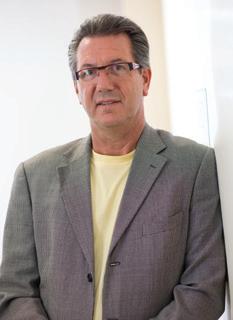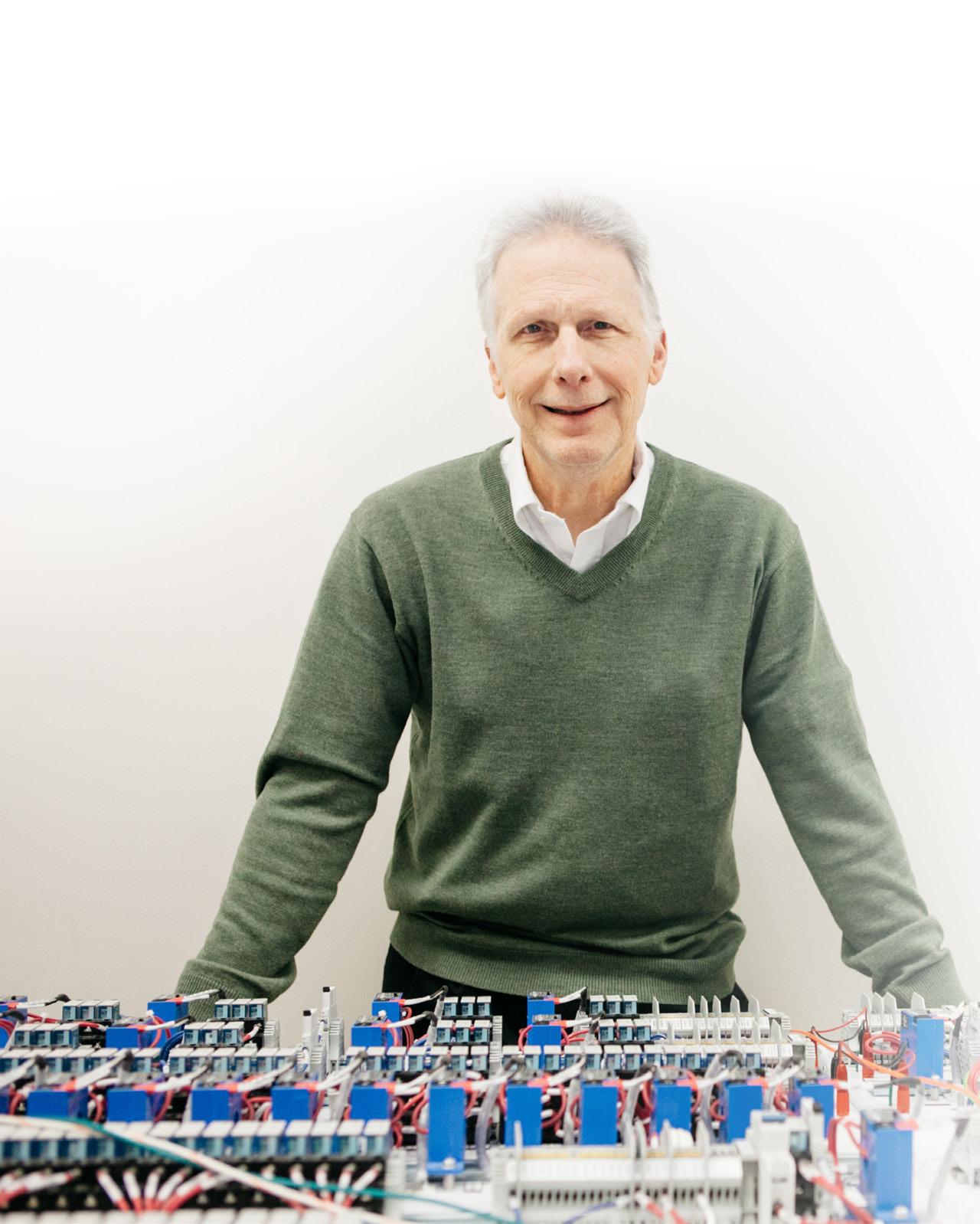
9 minute read
At the top of their profession
Marla E. Pérez-Davis completed her doctorate degree in chemical engineering at Case Western Reserve University in 1991. At the time, she was working full time at the National Aeronautics and Space Administration’s John H. Glenn Research Center in Cleveland, with a toddler son at home.
Advertisement

Marla Pérez-Davis PhD ’91, deputy director of NASA’s Glenn Research Center, stands in front of a highly modified DHC-6 Twin Otter aircraft in the center’s Cleveland Hopkins International Airport-based hangar. The aircraft is used for NASA research including most recently monitoring algae bloom in Lake Erie.
“As the English proverb says, ‘Where there’s a will, there’s a way.’ Some days just the driving back and forth under snow conditions was enough to test my determination,” said Pérez-Davis, who today serves as deputy director of the research center. The hardest part was missing her son’s playing time in exchange for the bedtime stories.
Balancing motherhood, family, work and school is not necessarily an easy task but can be done, Pérez-Davis added, with the help of a support system. “From the people that believed in you, to those that carried you or simply offered a hand to hold during trying times, my support was my husband at the time, friends, coworkers, mentors and my advisor at Case, Dr. Donald Feke,” she said.
Pérez-Davis is a native of Puerto Rico and earned her bachelor’s degree from the University of Puerto Rico and master’s degree from the University of Toledo in addition to her Ph.D. at Case. Her career with NASA spans 33 years. Immediately prior to being promoted to her current position in June 2016, Pérez-Davis served as the deputy director of Glenn’s research and engineering directorate, a post she held since 2014.
Other key leadership positions Pérez-Davis held at Glenn include director of the Aeronautics Research Office from 2010 to 2014, where she served as the focal point for aeronautics research and provided project management, leadership and oversight in support of the agency’s aeronautics research mission. She also served as chief of the Project Liaison and Integration Office and as chief of the Electrochemistry Branch.
Pérez-Davis has received many accolades over the years: recipient of NASA Outstanding Leadership Medal, 2015 Crain’s Women of Note, the Top 25 Elite Business Women, Hispanic Business Magazine and Women of Color Career Achievement, to name just a few. The Case alumna is quick to point out that her greatest achievements are because of her NASA team.
“It is not an easy task to single out key accomplishments because I have been very fortunate to work with an extraordinary number of individuals. None of those accomplishments will have happened without teamwork,” Pérez-Davis said. “One that comes to mind is the pioneering research back in the early 1990s with Dr. James Gaier, a NASA researcher. We conducted a series of tests evaluating the effects of Martian dust in power systems surfaces.”
This past year NASA Glenn Research Center celebrated its 75th anniversary. Glenn engineers successfully completed a series of tests at its Plum Brook Station on the Orion’s European service module test article, as well as testing of boundary layer ingesting propulsors. These are just a few of the great contributions and accomplishments that the space exploration and aeronautics workforce completed this past year, Pérez-Davis said.
Strong commitment to diversity and inclusion
Pérez-Davis is extremely thankful for NASA’s commitment to diversity and inclusion, which she considers key to mission success. The organization is recognized as a best place to work in government because of its commitment.
“From a personal perspective, I have learned to accept that at times we will encounter people that are going to judge us by our accent, our looks,” she said. “I have learned, too, that I have no control over people’s filters and perceptions. Inclusion is a choice, so choose wisely and you will be rewarded with the best solution, with creativity and innovation, and in the process, a better organization and workplace.”
From a career perspective, Pérez-Davis shared advice to anyone in or considering a STEM profession:
• Get to know your strengths and weaknesses. It is important for all of us to know what we are good at and what we need help with. You have to rely on your strength, but you have to work on your weaknesses.
• Be prepared and work hard. It doesn’t matter who you are, but as a woman in the workplace, it is even more important.
• Strive for life and work balance.
• Build a network. It provides for career and personal growth and can carry you in the difficult times.
• Find ways to give back, encouraging and motivating students to pursue STEM careers. The technology field is providing the leaders for tomorrow, so we need to do anything we can to encourage young people to pursue these careers.
• Learn from your mistakes. We all make them, so don’t be so hard on yourself. Celebrate your achievements.
By the numbers:
157 graduates from Case Western Reserve University work at NASA’s Glenn Research Center 61 hold Ph.D.s, 66 hold master’s degrees and 30 have undergraduates degrees
At the top of their profession
Jennie S. Hwang, PhD ’76
Chief Financial Officer and Principal, H-Technologies Group
Major: Materials Science and Engineering

On her education: The education I received at Case nurtured my ability of independent and creative thinking, as well as insightful, analytical acumen. Additionally, as the first woman to graduate with a Ph.D. in materials science and engineering, I also started learning what it was like to be the only woman in an environment.
What she wishes she knew as a student: I wish I knew then ALL that I know now! Actually, I even wish I had the knowledge level of 20 years ago. I am going into the fifth decade of my career – life is a joyful journey of learning! Young people should relentlessly prepare themselves for their career; work hard to gain diverse knowledge, starting now.
How to succeed as a woman in the STEM field:
Having been the only woman in most of my working environments, from the boardroom to the factory floor to the classroom, I do have abundant thoughts and a lot to share. Time is precious and how to use time effectively is critical. At either end of the spectrum, one can be not effective or can be very effective; it makes a huge difference in life and career.
Thoughts on her career: A career is not just a job working from eight to five. The work is always with you, either at your desk or on your mind. Learn how to focus and how to prioritize. There are many viewpoints on successful women having it all. I think it is possible and it is immensely rewarding to have a career and raise a family. There are times it can be very frustrating, but if you overcome it, the frustration is just a passing cloud. Look at the big picture rather than being pigeonholed by transient frustrations.
Additional advice: The real thing is the preparation, hard work, focus and the ability to endure and sustain. The most important thing is an individual’s mind and the effort on what you want to accomplish and work for – having that inner drive and confidence.
Myra A Dria ’76
President and Chief Executive Officer, Pearl Resources LLC, Pearl Resources Operating Co., LLC and Ristra Energy LLC
Major: Polymer Engineering
On her education: I learned to deal with the hardships and “speed bumps” of the road ahead as a woman in a highly male environment. This is increased 10x working in the South and another 10x working in West Texas.
What she wishes she knew as a student: The importance of maintaining networks with other women. Women are terrible networkers probably because their day is already crammed and what little time they have, they need for themselves. Maintaining these relationships is extremely time consuming and women have many different challenges than men in the same position.
How to succeed as a woman in the STEM field:
You must be tough, driven and self-confident. There is always going to be someone telling you that you can’t do it and will try to do what they can to position those

“speed bumps” in your road ahead. It is almost like being an Olympic athlete in your everyday job: “If it wasn’t tough, then everyone would do it.” The hurdles are set higher for women – not because we aren’t good, but 90 percent of the bosses are still men, and 55 percent don’t believe you should be in the same career as they are.
Additional advice: Change is very slow – take advantage of every opportunity to learn something new and focus on an entrepreneurial direction. Large companies are great for learning an industry and about business and financial discipline, but I see the most opportunities for people to spread their wings and fly high by participating in their own startup or in a small team of folks who share a high level of respect. Always advocate for Company #1.
Ka-Pi Hoh ’84, MS ’87, PhD ’89
Operations Manager, Finished Products, Lubrizol Corporation
Major: Macromolecular Engineering

On her education: My Case education taught me how to solve problems, which is what we encounter every day at work. I also learned how to give oral presentations and write clearly from my thesis advisors.
What she wishes she knew as a student: It’s important to understand the business you’re in and how you’re contributing to the business goals.
How to succeed as a woman in the STEM field:
Your technical skills are only one aspect of your performance. A high performer will also have the soft skills or competencies in leadership, communication, interpersonal skills, influence, etc. Women may be less willing to take risks but don’t be afraid to take risks, make mistakes and push yourself out of your comfort zone; you’ll learn a lot about yourself and what you’re capable of achieving.
About her career: I’ve been in my current position for about one year, after returning from a four-year expatriate assignment in China.
Additional advice: Make sure you’re doing something you enjoy and success will follow. Continue to learn and develop yourself after graduation. Be flexible and be able to adapt to changes especially as your career may move in lateral directions.










